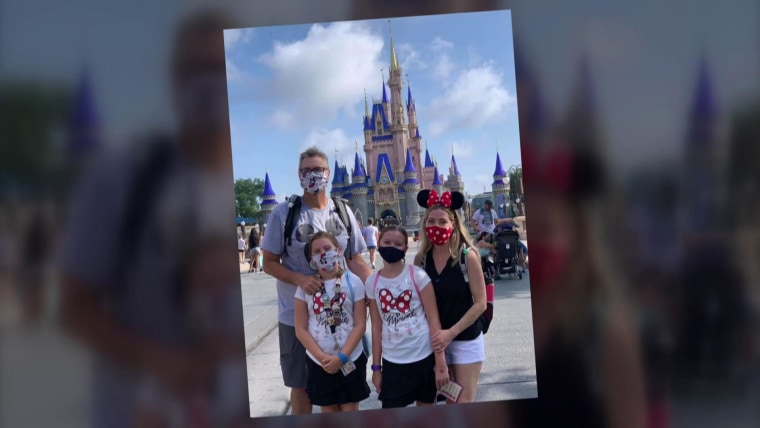Disney is laying off 28,000 employees, the entertainment giant confirmed Tuesday, as the Covid-19 pandemic continues to hammer its theme park operations, including the continued closing of its California parks and reduced capacity at its open parks in Florida and around the world.
The cuts, which will affect workers in the parks, experiences, and consumer products segment, were detailed in a letter to employees Tuesday. About 67 percent of the affected workers were part-time employees, but it's unclear what the breakdown for each department was. CNBC was the first to report news of the cuts.
July: Disney World reopens as coronavirus cases spike in Florida
JULY 13, 202002:27Disney has furloughed many workers since April, and it was continuing to pay health benefits. However, given the strain of the pandemic, it is no longer able to continue doing so, the company said.
"For the last several months, our management team has worked tirelessly to avoid having to separate anyone from the company," Josh D'Amaro, chairman of Disney's Parks, Experiences and Products division, said in the staff memo.
"We've cut expenses, suspended capital projects, furloughed our cast members while still paying benefits, and modified our operations to run as efficiently as possible. However, we simply cannot responsibly stay fully staffed while operating at such limited capacity," D'Amaro said.
D'Amaro said that as "heartbreaking as it is to take this action," it was the "only feasible option we have in light of the prolonged impact of Covid-19 on our business."
Theme parks in California remain closed indefinitely after plans to reopen in mid-July were scrapped because of surging numbers of Covid-19 cases. Officials in the state have yet to issue guidelines to reopen theme parks as California continues to take a more measured approach to reopen than Florida has.
Florida, which is home to Walt Disney World, SeaWorld Orlando, and Universal Orlando, allowed theme parks to reopen over the summer despite sharp spikes in case numbers. (NBCUniversal is the parent company of Universal theme parks and NBC News.)
While some guests did quickly flock back, many have stayed away despite efforts by the parks to enhance safety protocols. The low attendance numbers at Florida theme parks reflect the dramatic drop in tourism in the state over concerns about the pandemic and the risk of getting Covid-19.
Disney and Universal Orlando have also kept numerous hotels closed, and Universal Orlando even tried to boost attendance with major discounts for local residents and out-of-town guests.
Attendance, which was already limited by new capacity restrictions, continues to below, and it is likely to get worse now that the summer season has come to a close. The parks recently moved to shorten their hours of operation for the fall. They were already operating at reduced capacity and had been forced to close numerous attractions, rides, and events in part to cut costs, but the strain of the pandemic isn't likely to ease soon.
Disney lost $3.5 billion in its third fiscal quarter, which ended in June, because of theme park closings, according to the company's latest earnings report. It's an indication of the severe impact the coronavirus pandemic has had on the entertainment giant, in particular on its theme parks and resorts division.
The company's stock was at a record high in November, buoyed by its new Disney+ streaming service. But by May, when Disney reported second-quarter earnings, the company had already furloughed about 100,000 employees, slashed executive pay, and taken out a $5 billion line of credit.
SeaWorld furloughed 95 percent of its employees after having had to close all of its parks, and it cut executives' base salaries by 20 percent. The company reported second-quarter revenue of $18 million in August, compared to $406 million for the same quarter last year.
NBCUniversal also laid off a number of workers, including rounds of layoffs at Universal Studios. NBCUniversal's parent company, Comcast, reported a 25 percent drop in revenue for its most recent quarter, and it has also cut pay for senior managers and other well-compensated employees.
NBCUniversal CEO Jeff Shell alluded to how much the company's theme parks business had been "disrupted" in a letter to employees in September.
"As you would expect, attendance is down, but our guest satisfaction scores have never been higher," Shell said in the letter. "The financial impact at our parks has been significant and given the state of the broader tourism and travel market, it will take time to regain our momentum."


